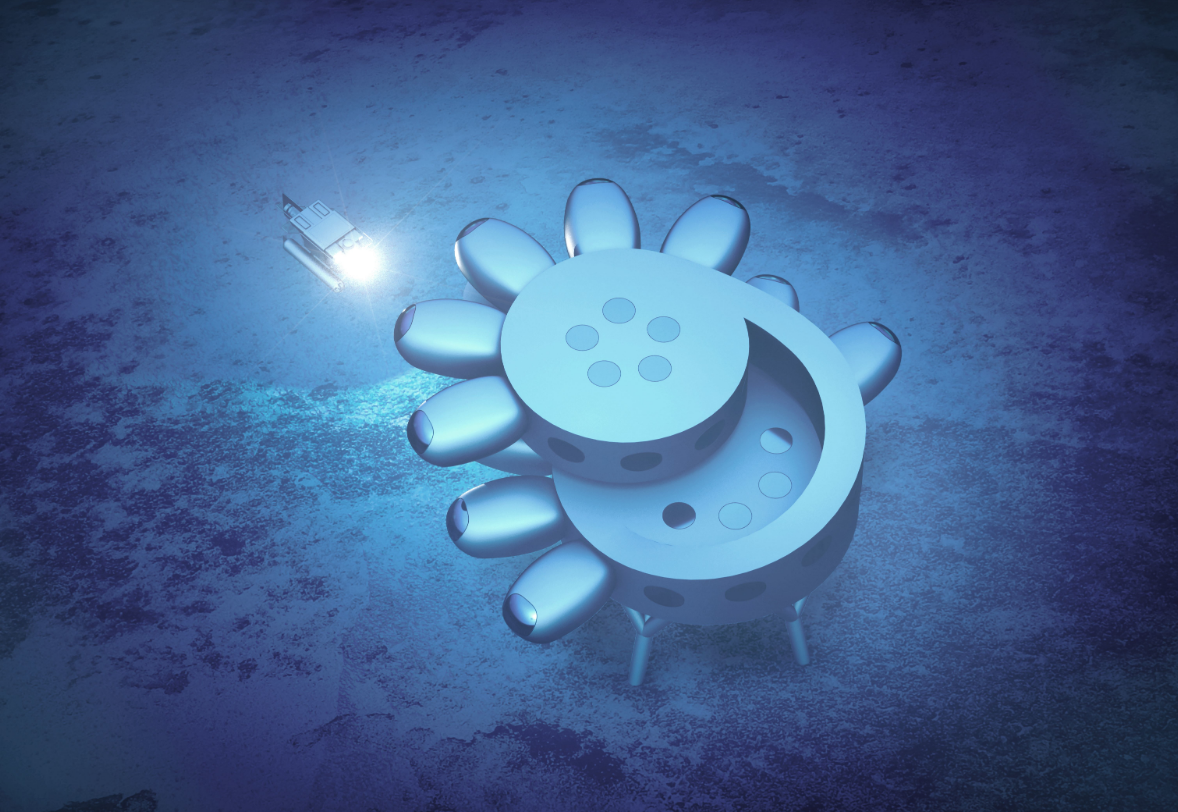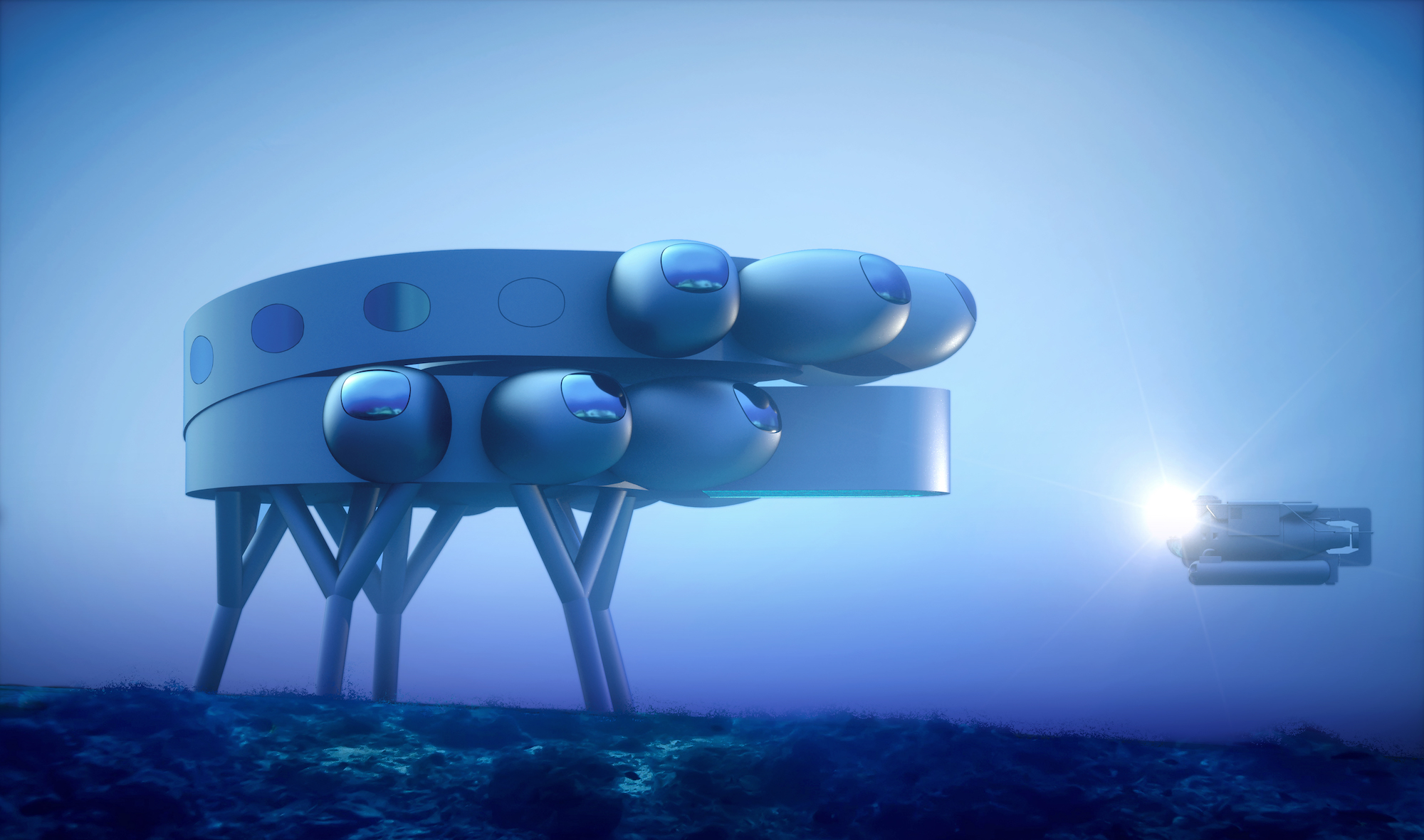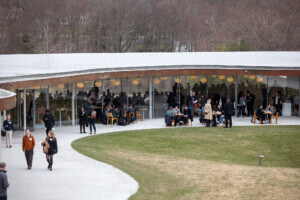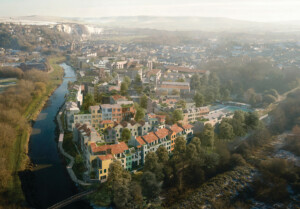Swiss-born industrial designer, surfing enthusiast, and tireless sustainability advocate Yves Béhar and his multifaceted design studio and branding firm fuseproject have unveiled initial conceptual designs for Fabien Cousteau’s Proteus, a research station and habitat touted as an undersea version of the International Space Station. Focusing on oceanic research, exploration, and conservation, the underwater scientific hub was conceived by noted aquanaut and documentary filmmaker Fabien Cousteau—grandson of Jacques—and his eponymous nonprofit Ocean Learning Center (FCOLC), which is based in New York. Described as the “largest and most technologically advanced underwater station ever built,” Proteus will, per a press statement, serve as “a platform for global collaboration amongst the world’s leading researchers, academics, government agencies, and corporations to advance science to benefit the future of the planet.”
While a cursory glance at the conceptual imagery of Proteus, named after the shape-shifting sea-god of Greek mythology, might lead to its dismissal as a sci-fi-inspired offshore folly—a particularly Verne-ian take of PR-chitecture—the idea isn’t that entirely quixotic. Nor is it that deep.
To be located off the biodiverse coast of Curaçao, Proteus would be built 60 feet under the surface of the Caribbean Sea, a depth that’s roughly half the standard depth limit for recreational divers. So, no, this isn’t James Cameron territory. By comparison, 60 feet is considerably deeper than, for example, Jason deCaires Taylor’s Molinere Underwater Sculpture Park in Grenada, which is just shy of 30 feet under the surface at its deepest. It’s also roughly twice the depth of Conshelf, the two-person underwater habitat developed off the coast of France by Cousteau’s grandfather in 1962.

This all being said, the mission of the not-buried-at-impossible-depths Proteus isn’t necessarily the stuff of fully submerged pipe dreams. Conceived to be the first in a potential network of underwater habitats, Proteus is a response to now, a project described by Cousteau as “being essential to driving meaningful solutions to protect the future of our planet.”
“As our life support system, the Ocean is indispensable to solving the planet’s biggest problems. Challenges created by climate change, rising sea levels, extreme storms and viruses represent a multi-trillion-dollar risk to the global economy,” he explained. “The knowledge that will be uncovered underwater will forever change the way generations of humans live up above.”
The project’s strategic partners include Northeastern University, Rutgers University, CARMABI, and University of Rhode Island’s Graduate School of Oceanography.
While Cousteau views Proteus as a vehicle in which to explore and unearth discoveries that could improve life on Earth, both terrestrially and aquatically speaking, there’s also the immediate benefits of job creation and tourism attached to such an ambitious project. In a statement, Dr. I.S (Steven) Martina, Minister of Economic Development for Curacao, mentioned the “enormous” economic potential of bringing Proteus to the waters of the Dutch Caribbean island.
As for the station itself, which is slated to be four times larger than any known underwater habitat and able to accommodate 12 brave souls at once, it would include expansive, state-of-the-art research laboratories, a moon pool, sleeping quarters, a video production facility that will enable around-the-clock streaming for educational purposes, and the world’s first underwater greenhouse. Power will come from solar, wind, and Ocean Thermal Conversion Energy.

Béhar, whose eclectic breadth of design work includes coworking spaces, prefab ADUs, smart locks, and fizzy beverage dispensers, described the design intent of the project as one that offers “an effective, comfortable and attractive facility for researchers, and an exciting underwater structure that garners the same passion for ocean exploration as we have for space exploration.” He added that Proteus “is both practical and an icon that will change the way we experience ocean research.”
Before any of this, happens, however, Cousteau and the FCOLC have to make one rather giant (and practical) step: successfully raising the $135 million needed to build Proteus and operate it for its first three years.











